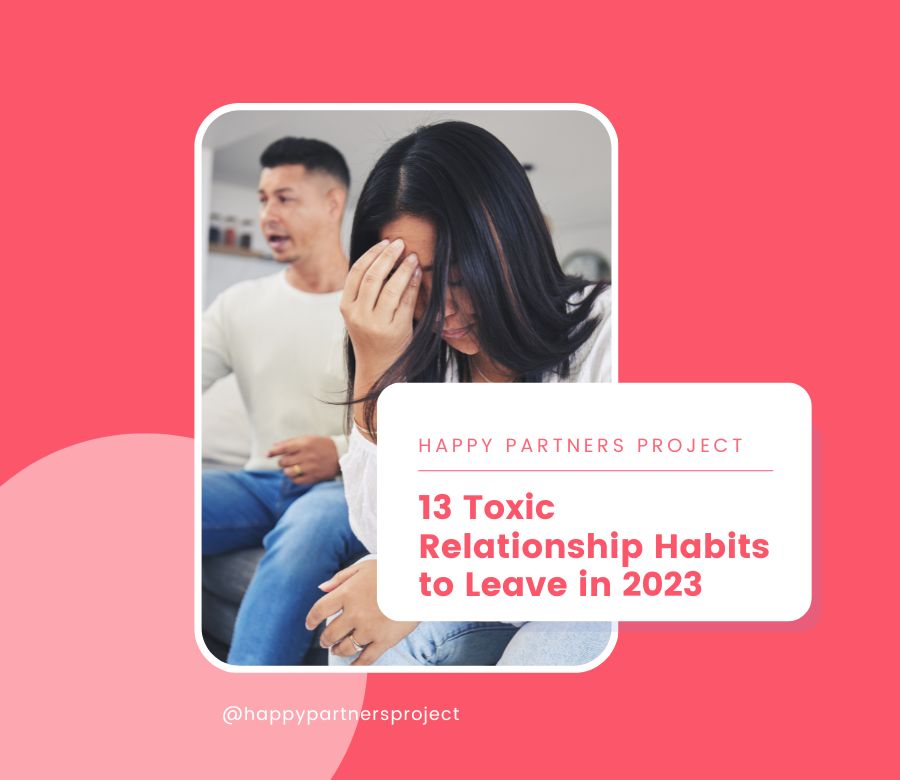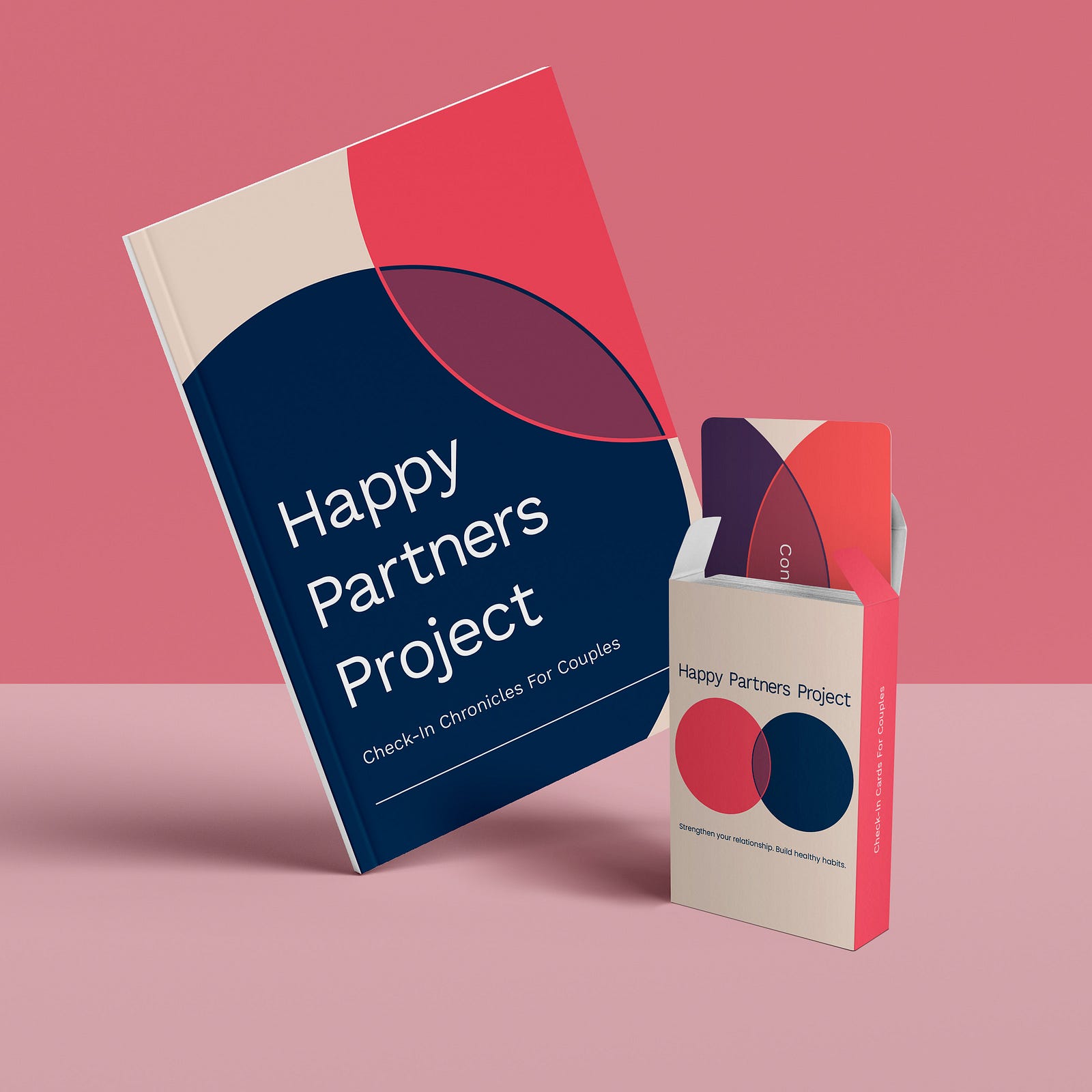
The 13 Most Common Relationship-Damaging Habits (and How to Fix Them Fast)
Share
Replace Toxic Patterns to Foster Deeper Intimacy

Even the healthiest couples struggle sometimes. It’s normal to hit snags, disagree, or disconnect from time to time in your partnership journey.
The key is how you handle conflict and nurture your bond on a daily basis. Do you tackle issues early in a caring way? Or let annoyances fester until everything blows up? Celebrate each other’s wins? Or mainly complain about faults?
Over the years, coaching couples to build thriving relationships, I’ve noticed 13 habits in particular that erode intimacy if left unchecked.
The good news? Every single one of these has a fix.
With some awareness, commitment to change and proactive communication between you and your partner, you can replace toxic patterns with healthy relating habits that foster closeness and trust and bring out the best in each other.
Ready to create positive shifts? Let’s get started...
1. Sacrificing Yourself
It’s so common to lose pieces of yourself when merging two lives together. We all know those people — the ones who are one person when single and a completely different person when in a relationship. Healthy relationships include space for both partners. For couples who lose themselves for the sake of their partner, to keep the peace, or any other reason, this toxic habit builds resentment in the long haul. Eventually, all those parts of yourself that have been denied for weeks, months, and years will come raging forward crying for attention. You aren’t doing the relationship any favors by being anything but your authentic self.
The Fix: Schedule regular “me dates” to honor those pieces of yourself you’ve neglected. Keeping your own life active and fresh gives you and your partner more to connect on, time to miss each other and keeps the spark alive and interesting. Grow together while still making space for your individuality.
2. Prioritizing Your Individual Needs Over the Relationship
This one is friends with the age-old adage — “There is no “i” in team” — but has a twist. Instead of melding with your partner and losing your identities, this toxic habit is about the “you vs. me” that can happen in the relationship, particularly around unmet needs or conflict. If the “relationship” is held as sacred then both partner’s needs are both partner’s responsibility to serve the relationship. It’s a subtle shift but with powerful implications — if both parties are responsible for serving the big picture relationship, then the dynamic shifts to “you+me vs the problem”.
The Fix: Identify shared goals and check in regularly on how you’re building the relationship you both want. When you notice you’ve shifted into “you vs me”, pause; then identify the problem and then collaborate on possible solutions that feel good to both parties.
3. Obsessing Over The Negative
Dwelling on issues without celebrating wins puts you in a funk where problems feel bigger than they are. I don’t know one person who has said they want to create a bad relationship dynamic but if you’ve heard the saying “where attention goes, energy flows” then you know that spending time on negative brings more negative and vice versa.
The Fix: Balance constructive feedback with gratitude for all that’s going right between you two. It’s important to take inventory of your problem areas but try to balance your constructive feedback on a six-to-one ratio. For every one thing that is going wrong, celebrate six that are going right.
4. Waiting for Fights to “Check-In” on the Relationship
Couples often ignore problems until small things build up and rupture into a massive fight. Not healthy! Waiting until a fight to “Check-In” on the relationship is a mistake. And if “calm until the storm” becomes routine, the relationship will be a series of peaks and valleys that over time will wear on the couple, until it breaks.
The Fix: Check in regularly so you can tackle issues early before they reach a breaking point.

5. Playing the Blame Game
My mom always used to say, “When you point the finger, you have three pointing back at you!” This one’s about taking responsibility for your role in the relationship. Nobody can make you feel or react a certain way. You choose that. And pointing the finger at your partner is copping out of taking responsibility for your contribution, your feelings, and your reaction. It’s also a way of attacking your partner instead of attacking the problem and finding a solution together. Plus, it fosters defensiveness, not compromise.
The Fix: Use “I feel __ when you __” statements to open an honest dialogue about needs. “I get angry when…because I feel like you don’t care.” Another way, “When I’m not spoken to with respect, I start to question if I can stay in this relationship.”
*This is the foundation of Non-Violent Communication. Look it up, or take a deeper dive with our Creating Conscious Relationships Course.
6. Controlling Behavior
Attempting to control who your partner spends time with, how they dress, or what decisions they make in their own life is unhealthy. True partnerships empower one another’s autonomy while still making space for the relationship. Controlling behavior usually comes from a place of possession, jealousy, or attempting to compensate for one’s insecurities. But it severely damages trust and connection over time.
The Fix: Give your person space and autonomy. A relationship should amplify both individuals.

7. Jealousy/Possessiveness
Irrational or excessive jealousy usually signals a deeper lack of trust and confidence in the relationship. While natural concern over cheating can occur after being hurt before, unchecked jealousy leads to controlling tendencies like monitoring a partner’s behavior or friend group. It prevents both individuals from feeling free and destroys the mutual respect great partnerships are built on. Healthy couples nurture total assurance and faith in each other.
The Fix: First is to identify your triggers and what makes you feel unsafe. Communicate those to your partner and come up with a game plan. What phrase can you say when you’re triggered that prompts them to give reassurance? What can they do proactively to reassure you before the trigger hits? It’s key to build trust so jealous triggers are phased out.
8. Dishonesty (and unreliability)
This is a big one, and often misunderstood. Most don’t realize that honesty and reliability occur on a micro level with every interaction, from the first conversation, the first date, and so on. Trust and honesty are inextricably linked. If your word is gold, so will your relationship go for the gold. Broken commitments and “little white lies” erode intimacy over time.
The Fix: Try on “Radical transparency”. Commit to only the things you truly intend to honor. Integrity is everything for relationships. Consider your “Reveal to Conceal Ratio” — how much are you revealing vs concealing from your partner. Honesty builds intimacy. Don’t sacrifice long-term trust for short-term avoidance.
9. Manipulation
Manipulation includes verbal assaults, emotional coercion, physical violence, gaslighting, and other tactics meant to intimidate or exercise unhealthy control. While conflicts naturally arise, purposefully tearing your partner down rather than communicating with care destroys couples from the inside out. Healthy disagreements involve two equals choosing to understand each other. Manipulation poisons this kind of mutual understanding and respect.
The Fix: Foster mutual care and respect. Manipulation poisons partnerships.
10. Disrespect
Disrespect manifests in name-calling, mocking someone’s interests or needs, publicly embarrassing a partner, and other unkind words or deeds. These tear down self-esteem and breed contempt, frustration, resentment on both sides over time. They signal someone does not know how to argue respectfully. Practice unconditional positive regard and kindness in speech and actions instead. Speaking and acting with care, especially during conflict, builds trust and intimacy.
The Fix: Practice unconditional kindness with your partner in speech and actions.

11. Stonewalling
Refusing to communicate during conflict or shutting someone out for extended periods is unproductive behavior that is meant to punish or manipulate the partner into submission. It signals poor conflict resolution skills and an inability to argue constructively as a team. You’re supposed to be on the same side! While taking space to cool off can help at times, stonewalling your partner prevents issues from ever getting resolved healthily. Stay present and keep conversing even when tensions run high instead. Silence solves nothing.
NOTE: Sometimes, stonewalling can get confused for a trauma-response of getting shut down. In the face of conflict, some people’s unhealthy adaptations from childhood include shrinking into themselves and internalizing the battle. This is not stonewalling. I’ll give two fixes below that address both causes of the “silent treatment”.
The Fix: Stonewalling: Recognize that the silent treatment won’t get you what you want with your partner, short-term or long-term. Stay open and keep conversing, even when tensions run high. Trauma-response: Give your trauma response a voice. It could say “I’m shutting down. I need to take a break and go be alone. Can you come check on me in 20 minutes?” (the time frame is personal and situation-dependent, but stick to whatever time you have given.) Work little by little to let your walls down after that time so you can resolve the conflict.
12. Scorekeeping
Tallying up “I owe yous” and keeping score of every time a partner falls short breeds resentment on both sides over time. When someone fixes dinner three times in a row or handles a sick kid all day, tallying up their contribution versus your own leads to petty arguments. This tit-for-tat scorekeeping destroys the mutual care and understanding great partnerships are built on. Choose gentleness and empathy in each passing moment instead.
The Fix: Let the little things go instead of keeping score. Choose gentleness in the moment.
13. Volatile Fights
Screaming, throwing things, storming off, or other extreme reactions during conflict reveal poor self-regulation and the inability to resolve disagreements constructively. Volatile fights indicate immature conflict resolution tactics of lashing out instead of hearing each other out with care and respect. While taking space to cool off can help at times, avoiding difficult conversations or refusing to come back to connect won’t make problems disappear.
The Fix: Learn to monitor your own emotions, speak respectfully, and fairly argue out issues with your partner instead. Cool off if needed but always come back to connect. Doing so deepens understanding and builds trust over time, even through rough spots.
Our Creating Conscious Relationships Course has some excellent lessons and activities for learning how to resolve conflict.
I know looking at unhealthy habits can feel overwhelming. But every couple has room for growth. Focus on one tweak at a time, celebrate small wins, and don’t lose hope.
With awareness, patience and clear communication, the healthy relating skills needed to nourish an intimate partnership are all attainable. Even if they require relearning deeply ingrained patterns.
When you replace toxicity with empathy and care for self and other, your relationship transforms. You’ll be amazed at the positive ripple effects making these shifts can have in all areas of your life.
The key is taking that first step and committing to the journey together one day at a time.
You’ve got this!
And I’m here cheering you both on.
